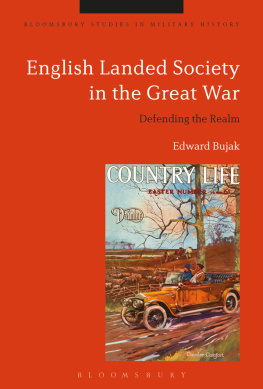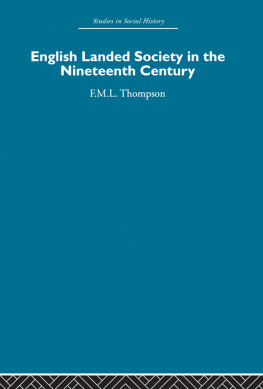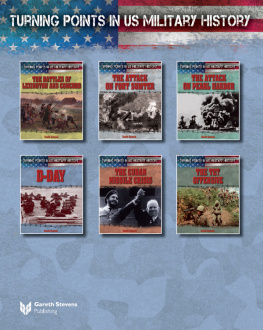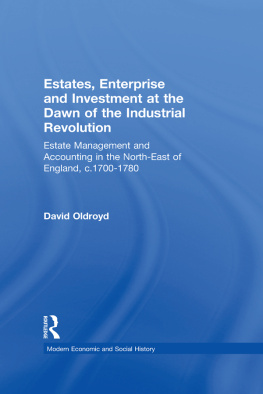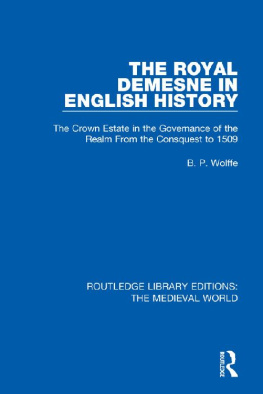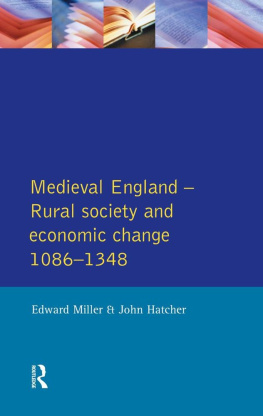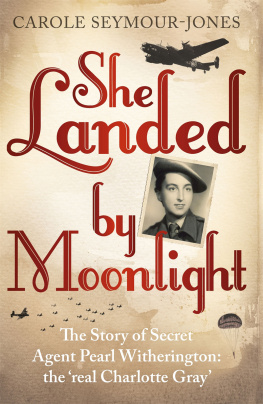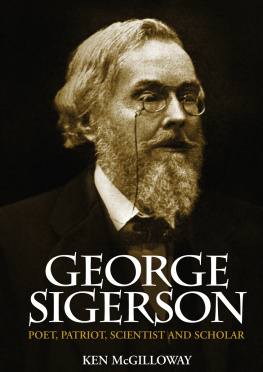English Landed Society in the Great War
Dedicated to the Memory of:
Philip James Forster, Private (6901)
Died of wounds received serving with the 1st Battalion, Norfolk Regiment
24 September 1914
Buried: Brighton City (Bear Road) Cemetery
Sidney Percy Forster, Private (40253)
Killed in action serving with the 8th Battalion, Bedfordshire Regiment
20 November 1917
Buried: Ribecourt British Cemetery, France
Charles Robert Moy, Private (23185)
Killed in action serving with the 6th Battalion, Kings Own Yorkshire Light Infantry
7 September 1915
Buried: Ypres Reservoir Cemetery, Belgium
Peace After Strife
Bloomsbury Studies in Military History
Series Editor: Jeremy Black
Bloomsbury Studies in Military History offers up-to-date, scholarly accounts of war and military history. Unrestricted by period or geography, the series aims to provide free-standing works that are attuned to conceptual and historiographical developments in the field while being based on original scholarship.
Published:
The 56th Infantry Brigade and D-Day, Andrew Holborn
The RAFs French Foreign Legion, G.H. Bennett
Empire and Military Revolution in Eastern Europe, Brian Davies
Reinventing Warfare 19141918, Anthony Saunders
Fratricide in Battle, Charles Kirke
The Army in British India, Kaushik Roy
The 1711 Expedition to Quebec, Adam Lyons
Britain, Germany and the Battle of the Atlantic, Dennis Haslop
Military Transition in Early Modern Asia, 14001750, Kaushik Roy
The Role of the Royal Navy in South America, Jon Wise
Scotland and the British Army 17001750, Victoria Henshaw
War and State-Building in Modern Afghanistan, edited by Scott Gates and Kaushik Roy
Conflict and Soldiers Literature in Early Modern Europe, Paul Scannell
Youth, Heroism and Naval Propaganda, Douglas Ronald
William Howe and the American War of Independence, David Smith
Postwar Japan as a Sea Power, Alessio Patalano
The D-Day Landing on Gold Beach, Andrew Holborn
Australian Soldiers in the Boer and Vietnam Wars, Effie Karageorgos
The Royal Navy in the Age of Austerity 191922, G. H. Bennett
General Lord Rawlinson, Rodney Atwood
Forthcoming:
Australasian Propaganda and the Vietnam War, Caroline Page
Reassessing the British Way in Warfare, K. A. J McLay

Contents
With grateful thanks to Dr. Nicola Boyle, Joanne Bujak, Phyllis E. Bujak, Professor Jeremy Black, Justin Hobson, Dr. Caroline Magennis, Professor John Martin, and Dr. Helen Snow for all their help and support in getting the job done.
The landed aristocracy and gentry sold land in unprecedented quantities both before and after the Great War. This book explores the period in-between. In 1914, the aristocracy went to war as a landowning aristocracy. Young)?
In these circumstances, did the actions of young aristocrats at the Front, fighting for England and the autonomy of the landowner, become subordinated, at home, to the needs of a state confronted by the German U-Boat? This shift in emphasis, in what was expected of English landed society during the Great War, is visible in Country Life, as the magazine moved away from being a journal of country gentlemen at war to a countryside at war. This earlier emphasis on the aristocracy at war was captured in a series of articles on each county, in which, as M. J. explained:
It has been our object to describe as far as may be the loyal services rendered by the English gentleman, county by county, gifts that are but momentarily realised. They are diverse in character, and till the war is over it will not be possible to make any complete enumeration. The imagination of the public is stirred by the picture of great houses converted into hospitals and convalescent homes. But the sum and volume of the services of the country
Through these articles Country Life amplified the sacrifice of families such as the Grenfells that might otherwise have remained tucked away in the Bucks Herald:
Some of the leading families in South Bucks, the Grenfells especially, have suffered very severe losses during the war. [In 1915] Captain Riversdale Grenfell was killed in action, and his twin brother, Captain Francis Grenfell, V.C., fell in battle after having been twice invalided home to England wounded On May 28 was announced the death from wounds received in battle of Captain Julian Grenfell, D. S. O., the elder son of Lord and Lady Desborough, of Taplow Court, and cousin of the twin brothers. Lord Desboroughs younger son is also at the front, serving in the Rifle Brigade, and his daughter, the Hon. Monica Grenfell is acting as a Red Cross nurse.
The Edwardian
The centrality of agriculture In 1918, Lloyd George proposed bringing:
people back to the land [if you bring] as many as you can, to the cultivation of the soil you will have a fine, healthy, happy population living on the land There must be a scheme for settling our gallant soldiers and sailors on the land I am told that a good many of them who have been living an open-air life do not want to return to the close atmosphere of the workshop and the factory There are those who prefer little allotments, and others who prefer a house and garden [They] must have a grant for the purchase of the necessary land and equipment whatever the grant, it will be small compared with the cost of the war. Two days of that war will provide you with a vast number of allotments and small holdings and equip them for these heroic men That is the least we can do.
By giving former fighting men a home on the land, England would become a fit country for heroes to live in or as the popular slogan had it, a land fit for heroes.
In 1902, Rider Haggard had called for an end to our national neglect to maintain the population on the land [Englands] greatest safeguard lies in [a population] rooted in the soil and supported by the soil. Lloyd George.
In 1909, Lloyd George in his Peoples Budget, proposed a series of new taxes on land values and the valuation as Lloyd George had made clear, speaking in Limehouse, in 1909:
The ownership of land is not merely an enjoyment, it is a stewardship and if the owners cease to discharge their functions in seeing to the security and defence of the country, in looking after the broken in their villages and their neighbourhoods, the time will come to reconsider the conditions under which land is held in this country. No country can permanently afford to have quartered upon its revenue a class which declines to do the duty which it was called upon to perform
A landowning aristocracy
The war was the tipping point because, the Edwardian aristocracy Pound,
represented the old chivalry
These were young Ironically, this was the same modernity which had seen stately homes deliberately repositioned as the
centre of modern country life [where] country sports proved an enjoyable alternative to hard work in tune rather than in conflict with modernity the motor car, made it possible to enjoy a traditional country life without its responsibilities [for which they were attacked by Lloyd George]. A frivolous but also glamourous image was being cultivated for the aristocracy. Young Lord Rocksavage, one of the wealthiest and also the most beautiful of all the young men of his day, set the tone by driving a red Mercedes around the country houses of England country houses were prized not for their aesthetic or historic value, but for their luxuriousness as homes, their convenience for hospitality, their usefulness for country sports

